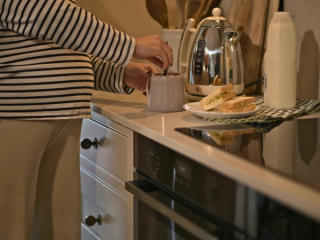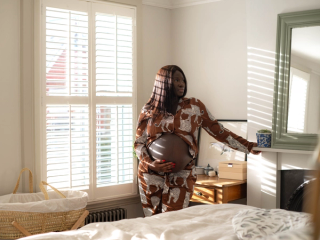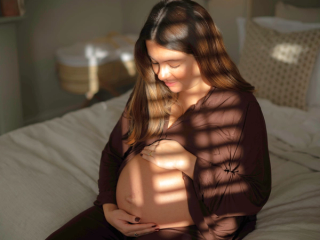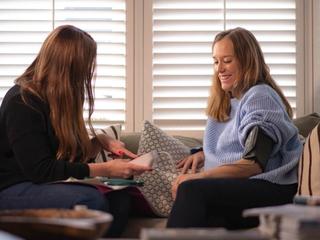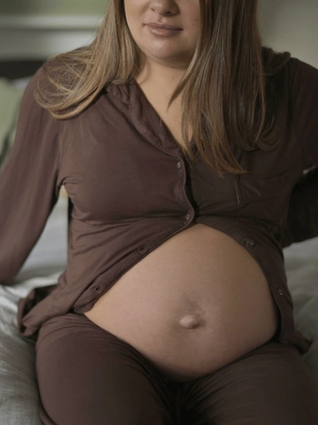
- Home
- Advice And Support
- Pregnancy
- Pregnancy Symptoms & Issues
- Body Changes During Pregnancy
Body changes during pregnancy
Learn about the physical changes during pregnancy, from trimester shifts to body adjustments, and how to embrace each stage for a healthy pregnancy.
Growing a baby comes with a lot of side effects. On the one hand, there are the expected ones – the baby bump that slowly expands to the size of a small house, accompanied by growing breasts, stretch marks, and various aches and pains. But some of them are more unexpected: acne; haemorrhoids; constipation. Though these pregnancy symptoms can be unwelcome, they are not unusual and it can be helpful to read up on how the body changes during pregnancy so that you know what to expect.
We’ve also asked some of our HiPP mums to chip in with their experiences of coping with body changes during pregnancy.
Common physical changes during pregnancy
‘This is the thing I really struggled with: a changing body,’ says HiPP mum Helen. ‘No matter how many times people told me that I should be happy that my changing body was due to growing a baby, it didn’t help. Everyone is different, and copes differently, so I would say it’s ok to just accept the way you feel, and know that you can get your body shape gently back with no pressure once your baby is born.’
It's not just your changing shape you have to deal with, though. There are also a host of other physical changes to cope with.
Tired all the time? Fatigue can be the earliest symptom of pregnancy – before morning sickness even kicks in. The best thing you can do for this kind of full-body tiredness is get plenty of rest. If your body says you need a post-work nap, do it. There are no prizes for pushing through your exhaustion.
Later in your pregnancy, when baby kicks, heartburn, and constant trips to the toilet are preventing you from getting a good night’s sleep, fatigue can set in once again. The same advice applies. Rest up. Let people look after you. And remember, just because women have been having babies since time began, that doesn’t mean it’s not hard.
Morning sickness (https://www.hipp.co.uk/pregnancy-baby-toddler-advice/expert-articles/morning-sickness/) is probably the most well-known of pregnancy symptoms. This poorly-named phenomenon can strike at any time of day and may last into the early part of the second semester – with some poor mums-to-be suffering throughout their pregnancy. Morning sickness is thought to be the result of heightened hormone levels, and can be eased by getting plenty of rest, eating little and often, and staying hydrated, though unfortunately there is no ‘cure’ for morning sickness.
Pregnancy acne is also the result of hormone changes during pregnancy and can be quite upsetting and unexpected given the narrative around the ‘pregnancy glow’. Not everyone experiences pregnancy acne, and there is no specific timeline for when it might appear, but if you do find yourself breaking out like a teenager, don’t reach straight for medical treatments. Some ingredients in acne medication are not recommended for pregnant women, such as retinoids. Speak to your healthcare provider for advice.
You can help your skin out by following a good skincare routine, eating well and staying hydrated. Avoid scrubbing at your skin as it will irritate it and may worsen the problem. And above all, be kind to yourself. This is not the time to hold yourself up to the impossible beauty standards extolled by social media. Talk to yourself as you would your best friend. Remind yourself what your body is busy doing.
Around 8 out of 10 women get stretch marks during pregnancy, as their skin adjusts to the rapid growth of their bodies. The stage at which you get stretch marks will depend on your skin elasticity, so there is no definite point at which you can expect stretch marks, though most people will get some. If your stretch marks get you down, remember – they will likely fade over time, and there are some lotions out there that may help your skin to stretch without marking so badly.
Our HiPP mums recommend Bio-Oil, Fantastic Skin Elastic, Neals Yard’s Mothers Balm, or even regular moisturiser to help improve skin elasticity.
‘Someone told me that the secret is to gently exfoliate your bump every day in the shower and then use any old moisturiser, so I did that,’ says HiPP mum Leah, while Jo advises: ‘Embrace it; what’s a few stretch marks anyway?’
Oestrogen and progesterone are on the rise throughout pregnancy, supporting the physiological changes required to grow and deliver your baby.Other hormones are also at play: relaxin and oxytocin. Relaxinhelps relax your ligaments to enable your body to accommodate the growing foetus and soften sufficiently for birth. Oxytocin, also called the ‘love hormone’, stimulates milk ejection during breastfeeding.
Our hormones affect everything from sleep to appetite and, yes, mood. So don’t be surprised if everything feels topsy-turvy for a while. There’s a difficult balance to achieve between understanding the impact hormones can have on your mood and acknowledging the reality of how you feel. Your feelings are valid, even when they seem irrational.
All the physiological changes that occur during pregnancy can leave you with aches and pains that can make for difficult days and disturbed nights. You might suffer with cramp in your calf muscles and feet, which is usually worse at night. You may also experience pelvic girdle pain (PGP), lower back pain, tension in your shoulders, and general body aches.
Some of this can be explained by your body adjusting to your growing baby and uterus, while some of it is once again hormone related. And of course, you’re supporting extra weight and probably sleeping in an unnatural position, both of which contribute to additional aches and pains. Try a pregnancy massage to help relax those tense muscles, and don’t forget to keep active.
Your breasts are changing in readiness to feed your new baby, so expect them to grow and become more tender as your pregnancy progresses. Your nipples may also change colour – often growing slightly darker – and size, while the little bumps on the areola may grow more noticeable. You might also notice the veins around your breasts grow more prominent. Though all these changes are normal, it’s important to keep an eye out – as usual – for any new lumps, bumps or dimples in your breasts during pregnancy and always see a doctor if you are concerned.
From surprisingly early on in your pregnancy, around the 3 month mark, your breasts can start producing colostrum (https://www.hipp.co.uk/pregnancy-baby-toddler-advice/expert-articles/harvesting-colostrum/). You might also notice a creamy/yellowish fluid leaking out of them. If you would like to collect colostrum in preparation for your new arrival, wait until you are around the 36/37 week mark. Your midwife should discuss colostrum collection with you, but don’t be afraid to ask for more support if you need it.
Hormones are once again at work on your digestive tract, which can slow down during pregnancy. Keep your fluids up and make sure you’re getting plenty of fibre in your diet, as well as gentle exercise. Note that iron supplements can make you constipated, so don’t take them unless you’ve been advised by your healthcare professional. You might find liquid iron easier on your digestive system than tablets.
Heartburn and indigestion can make you very uncomfortable, particularly during the later stages of your pregnancy when your bump is squashing your internal organs. You can safely take over-the-counter relief like Gaviscon, but if you’re really struggling, talk to your healthcare professional. You may find particular foods and drinks irritate your system. Keeping a food diary can be a good way to identify the problem foods so you can avoid them. Eating little and often, rather than having big meals, will also help ease your discomfort.
Haemorrhoids, or piles, can occur when you are constipated and having to really push through your bowel movements. Piles are actually swellings containing enlarged blood vessels and can cause itching, aching and pain. Try to keep hydrated and maintain a good diet with plenty of fibre to ease constipation and the symptoms of haemorrhoids. You can also get over-the-counter medicine to relieve pain and itching, though these will not ‘cure’ your haemorrhoids.
Progesterone relaxes the walls of your blood vessels, which can allow blood to pool and give the appearance of lumpy, twisty veins – known as varicose veins. Varicose veins are not dangerous, but can feel achy, itchy and uncomfortable. Varicose veins will likely disappear after pregnancy, but if they don’t there are treatments available (though not on the NHS).
Your body holds onto more water while you’re pregnant, resulting in swelling in your ankles, feet, calves and hands. For the most part, swelling is normal and to be expected – particularly at the end of the day. Maintaining gentle exercise, putting your feet up and avoiding long periods of standing will all help reduce swelling. A sudden increase in swelling can be a sign of pre-eclampsia. If you notice swelling alongside headaches, blurred vision or nausea, speak to your healthcare professional.
There are a lot of reasons why you will likely experience some emotional changes during pregnancy. Hormones are, of course, a big factor in change of mood, but not the only thing to consider. You’re going through a big life change and facing huge uncertainties – it’s normal to feel overwhelmed at times.
Depression doesn’t only strike in the post-partum period – it’s also possible to experience antenatal depression. If your mood is low and you feel unable to connect with friends, family or the world around you, talk to your healthcare professional. Antenatal depression can be managed with treatment (therapy or antidepressants) and should be addressed, as it could get worse and might continue after the baby is born.
It is normal to feel worried during pregnancy. Mums-to-be often fear childbirth, worry about the health of their baby, and what kind of parent they will be. It’s good to talk about these worries with family and friends, or even find new people to talk to at your antenatal class or perhaps pregnancy yoga. If your anxiety is preventing you from engaging in normal activities, please seek support from your midwife or GP. You don’t need to suffer in silence. There is help available.
Dizziness during pregnancy can be caused by a number of things, such as changes in blood pressure, anaemia, dehydration, or simply getting up too quickly.
Try not to move too quickly from a resting position to standing, and make sure you’re eating well and drinking plenty. If you regularly feel faint, talk to your healthcare professional. They can check your blood pressure, iron levels and blood sugar levels to make sure there’s nothing going on.
Other changes throughout the pregnancy
Your body is going through a lot, and there is a lot on your mind – it’s no wonder all these physical and emotional changes can result in sleep problems. Whether you’re finding it hard to fall asleep, or keep waking early, it can be frustrating to lay in bed feeling tired and still completely unable to get the sleep you need. Try not to worry, as worrying about sleep is a sure way to not get any!
You can catch up on lost sleep with late afternoon naps or weekend lie-ins. If there’s something particular that’s keeping you awake, try talking to your partner, family or friends about it. Sometimes you just need to get a worry out of your brain and into the open. You could also attempt a restful nighttime routine – such as a post-dinner walk, relaxing bath, minimal screentime and a book before bed. It’s all good practice for when you’re trying to get your baby to sleep in a few months’ time!
Positive affirmations
Whenever you’re feeling low on body confidence, positive affirmations are a way to make you speak kindly to yourself. Though you may feel a bit silly, saying it out loud can help ensure the message sinks in and isn’t undermined by your critical inner voice.
Consider writing out key phrases that help you feel happier and more confident, and stick them in places where you’ll see them every day – around your bathroom mirror, in the pages of your diary, on the fridge, etc. Here are a few examples:
- I am surrounded by love, and so is my baby
- I am capable and strong
- I am healthy, happy and pregnant
- It’s ok not to love every day of my pregnancy
- I don’t have to be perfect to be a good mum
Lifting yourself up when you’re feeling down
When you’re struggling with morning sickness, or feeling the full burden of your growing uterus, it’s ok to take some time to yourself to feel rubbish, veg on the sofa and binge watch Bridgerton.
However, if you feel like you’re sinking into the feeling, it’s time to work on finding a way out.
Our HiPP mum Laura found she really struggled with body image and weight gain during pregnancy. ‘My partner is so great and knows once I get out and move I feel better. He gently encourages me to go for walks with him and that always helps lift me up when I am feeling down.’
You might also find it helpful to spend time envisioning your ideal future – a brightly coloured nursery, or a first family holiday. Get on Pinterest and make yourself some mood boards. Of course, life doesn’t often look like a Pinterest post, but it’s nice to have things to look forward to when you feel stuck in a never-ending pregnancy.
If you simply can’t lift yourself out of your low mood, talk to someone. Whether you confide in a friend or a midwife, it’s best to get these feelings out into the open so that you can start getting the support you need to feel happier and more resilient.
